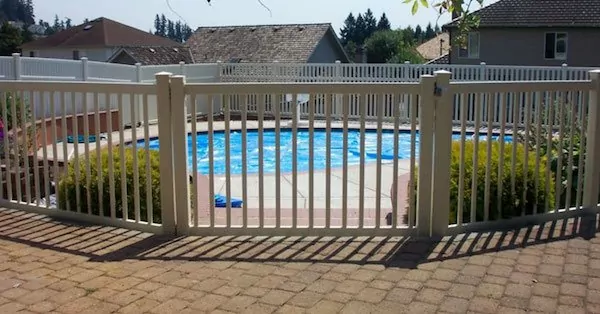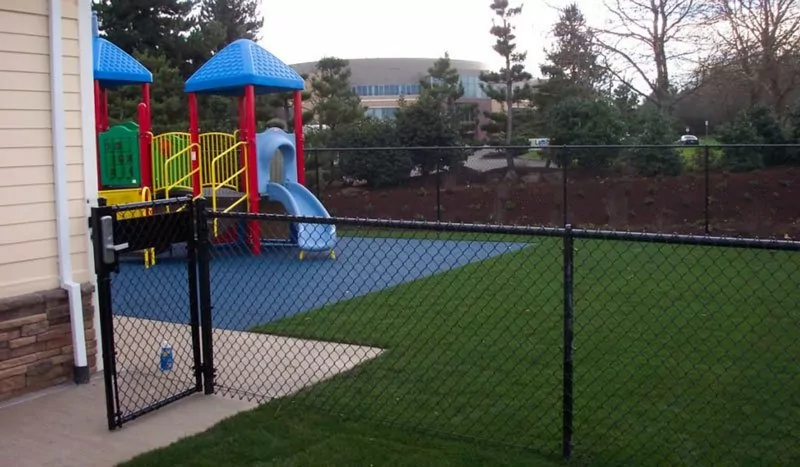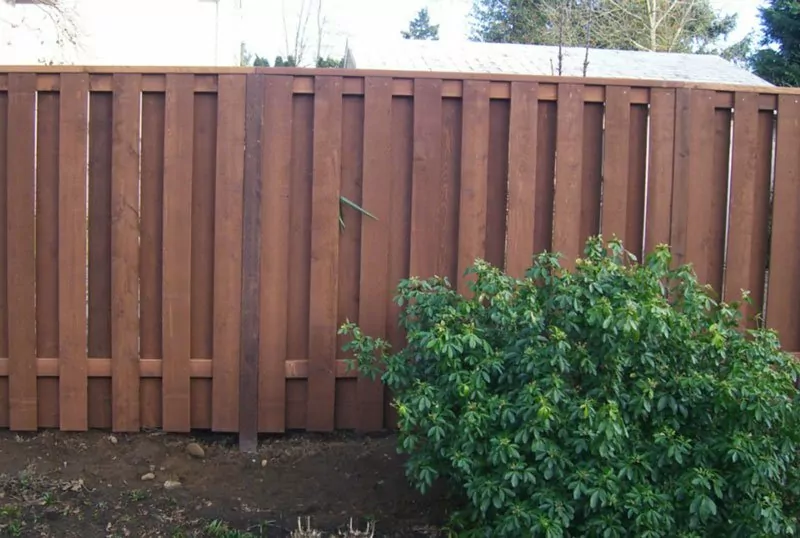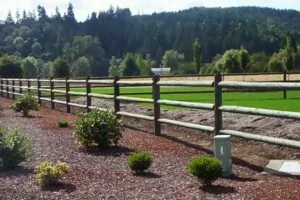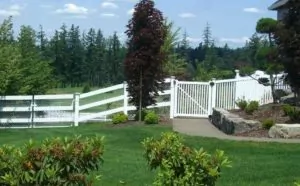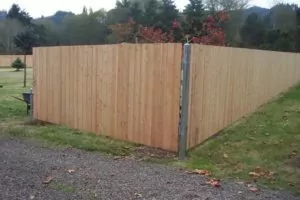Chain link, wood and vinyl are three of the most popular materials for fences. These three types of fences are great for both residential and commercial properties. Each of the materials makes a fence that’s durable and good looking. Each type will provide security. So which should you choose? Before you decide, consider the differing strengths of chain link, wood and vinyl fencing.
Compare Chain Link, Wood and Vinyl Fences
What do you need your fence to do? Is security your top concern? Are you looking for more privacy? Do you have pets? A garden? A swimming pool?
Best for security: Chain link fencing provides great security. It’s strong and stands up to a lot of abuse. The taller the fence the harder it is to scale or jump. No matter how high the fence, a chain link fence won’t block the view. Chain link fences are a good choice for keeping dogs in the yard, deer out of a vegetable garden and ensuring an outdoor pool is secured. Check out our posts about designing a dog kennel or a dog-friendly yard.
Best for privacy: If you need privacy, a solid fence of wood or vinyl fits the bill. A fence from either material can give your backyard the feel of a sanctuary. With a solid fence, you can relax on your deck or in your hot tub without feeling like you’re on display. A privacy fence can make a small yard in a crowded neighborhood feel intimate and secluded. If your dog is hypersensitive to visual stimulation, a solid fence can cut down on barking and excitability.
Best for style: Are you looking for a stylish fence? Both wood and vinyl offer a bevy of great-looking designs. Vinyl fencing is manufactured to look like wood. Familiar styles such as pickets, lattice and other designs associated with natural wood are also available in vinyl. We also install decorative metal fences. Metal can be a great way to add an accent to your wood fence. A gate or top rail will make a wood fence stand out from the crowd.
Chain link is seldom thought of as decorative. Because it consists of open mesh, chain link blends with its surrounding. You can make chain link more eye-catching by adding slats or planting climbing vines. For more ideas, read our blog about enhancing the look of chain link.
Best for DIYers: Chain link fences are easy to install. Installation requires few tools and no special skills. The mesh comes in a roll or sections. A wood fence is more difficult to build. You’ll need basic carpentry skills and tools. There are many small pieces to cut and assemble. Vinyl fencing comes in panels or board and rail sets and can be fairly simple for DIYers. All fences require careful measuring and planning to correctly set posts.
Comparing Costs
When all else is equal, chain link fences have the lowest initial cost. Wood costs a bit more than chain link and vinyl is a little more expensive than wood. The cost of installation is based on materials and labor. Calculating expenses should include maintenance and repair costs.
Maintenance costs: You’ll need to clean a wood fence about once a year to rid it of organic material that could lead to rotting. The cost of cleaning is minimal. You’ll need to refinish the boards every year or two. Again, the cost isn’t a lot, but over time can add up.
Chain link requires no upkeep. Vinyl requires cleaning only when it’s dirty and never requires painting or refinishing.
Repair costs: Wood fences may last for 20 years or longer. The fence will deteriorate over time and individual boards may need to be replaced from time to time. If you care for your wood fence, it will last longer.
Vinyl won’t rot or fall prey to insects. The life expectancy of vinyl is longer than for wood. It needs no routine repairs.
Chain link also lasts longer than wood. Some chain link will rust, but we coat our wire mesh with galvanized zinc. Galvanized wire is protected from the elements. You’ll only need to repair chain link if something crashes into it or falls on it.
Materials costs: There are many variables that affect prices. Linear footage and fence height aren’t the only factors that determine costs. The type of wire or wood will change the cost of materials. Some fence styles require more hardware than others. Your choice of posts will also account for price differences. Posts may be made from steel or pressurized or natural wood.
Labor costs: Besides materials, every fencing company in Portland will have a slightly different price for labor. The more elaborate the fence, the more skill and time required for installation.
Building a wood fence is labor intensive and therefore costs more. Chain link fences are easier to install. The ease of construction is one reason a chain link fence costs less. Vinyl fences are also comparatively simple to build.
Contact Pacific Fence & Wire for more information on pricing. We can give you an accurate estimate once we know your needs.
Comparing Maintenance
As established, wood fences require more upkeep than the other two alternatives. Cedar fences resist the common pitfalls of rotting and insect pests. But even these fragrant fences will eventually rot. Yearly cleaning and refinishing keep a wood fence looking good for a long time. If you love the look of wood and are committed to building with a renewable resource, choose wood.
No time for maintenance? Both vinyl and chain link are virtually maintenance free. Like any outdoor structure, your vinyl fence may get dirty. Learn how to clean a vinyl fence to clear away algae, dirt or mud. Chain link fences don’t need cleaning or upkeep.
Are you ready for a new fence? Contact Pacific Fence & Wire today. We’ll help you compare chain link, wood and vinyl fences and make the right choose for your property and estimates are free.


